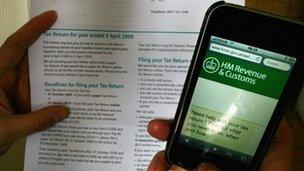Tax: HMRC to close all of its 281 Enquiry Centres
- Published

Most queries will now be taken over the phone and a home visit will take place if HMRC sees fit
The UK tax authority is to close all of its 281 Enquiry Centres which gave face-to-face help to 2.5 million people with tax queries last year.
The move in 2014 by HM Revenue and Customs (HMRC) will put 1,300 jobs at risk, although the authority aims to deploy these staff elsewhere.
The centres will be replaced by a telephone service and home visits, to save HMRC £13m a year.
But an accountancy body said some "very vulnerable" people could be affected.
"While we wish HMRC success in saving costs and making their brave new world of roving enquiry staff work, we wonder whether the timing of this change will come to haunt them," said Chas Roy-Chowdhury, head of taxation at the ACCA.
"One wonders whether this should really happen to a later and longer timetable to take account of the wide ranging changes to the tax and benefits system."
Early closures
The tax authority said that the number of people using the Enquiry Centres across the UK had halved from five million in 2005-06 to 2.5 million in 2011-12.
Each visit cost the service £152 on average, according to HMRC, but it said four out of five queries could have been solved on the telephone or online.
There will be a five-month pilot of the new telephone-based service in the north-east of England, starting in June.
Some 13 Enquiry Centres will be closed as part of the pilot, at Alnwick, Bishop Auckland, Bridlington, Hexham, Darlington, Durham, Middlesbrough, Morpeth, Newcastle, Scarborough, Stockton, Sunderland and York.
People will need to contact the phone line or go online to get their tax query answered.
Advisers may then decide that the issue should be discussed face-to-face at the caller's home or elsewhere, but there is no set procedure about which cases would require visits.
"We will give a more specialised phone service for customers whose affairs can be resolved over the telephone, and face-to-face help to those who need it, visiting them at a place convenient to them, saving them both travel and time," said Lin Homer, HMRC chief executive.
"HMRC will provide a more modern and accessible service that will target the right support to customers who need it, where and when they want it."
Cost-cutting
However, the authority has been criticised in the past for its call-handling efficiency. HMRC handles more than 60 million calls a year dealing with issues such as self-assessment tax filing, and VAT returns.
In January, Ms Homer admitted to the Commons Public Accounts Committee that some people faced waits of more than 10 minutes to get through.
From April, HMRC will have a target of making 80% of people wait no longer than five minutes to speak to a real person.
Call costs will also be reduced by the end of the summer.
In February, the National Audit Office said HMRC had improved its value for money in 2011-12 as it began a programme to reduce annual running costs by 25% by 2014-15.
HMRC is targeting a £955m annual reduction in running costs, as well as bringing in an extra £7bn in tax.
The PCS union, which represents some HMRC staff, said it was unhappy with the decision to close the centres.
"Closing all face-to-face tax offices would break the link between people in communities and an essential public service they rely on," said general secretary Mark Serwotka.
"If, as we fear, flawed research has been used to justify these closure plans then ministers must put an immediate stop to them."
Extra funding will go to voluntary sector organisations that might also deal with queries.
The Low Incomes Tax Reform Group said that the pilot needed to ensure that tax credit claimants on low incomes or those with particular needs benefited from an improved service.